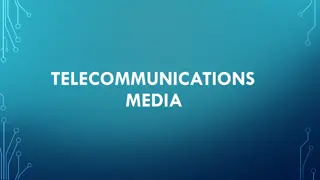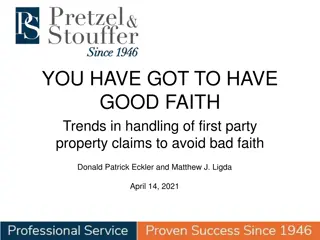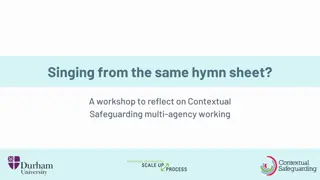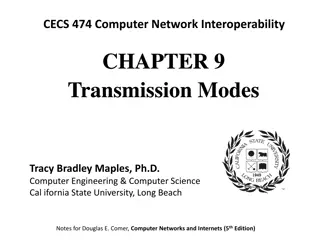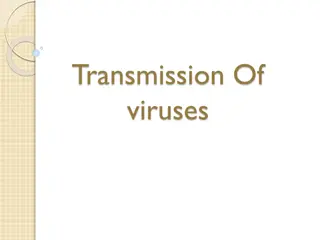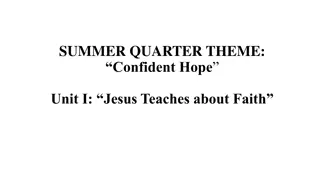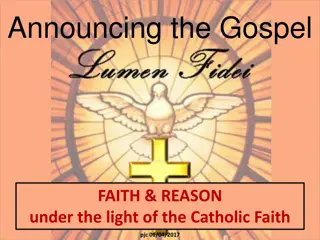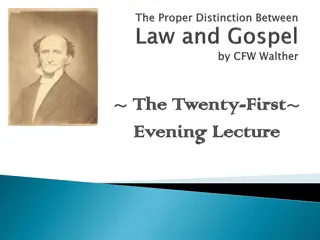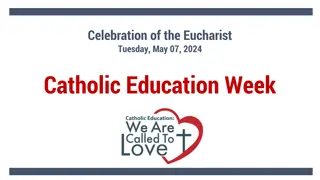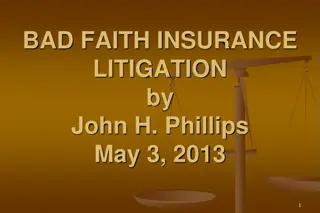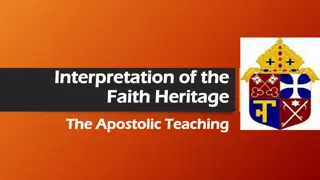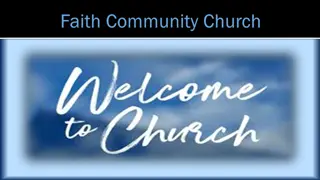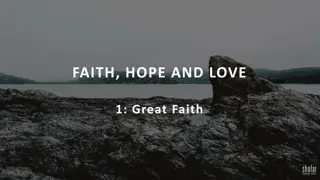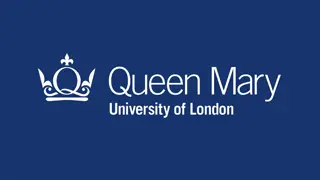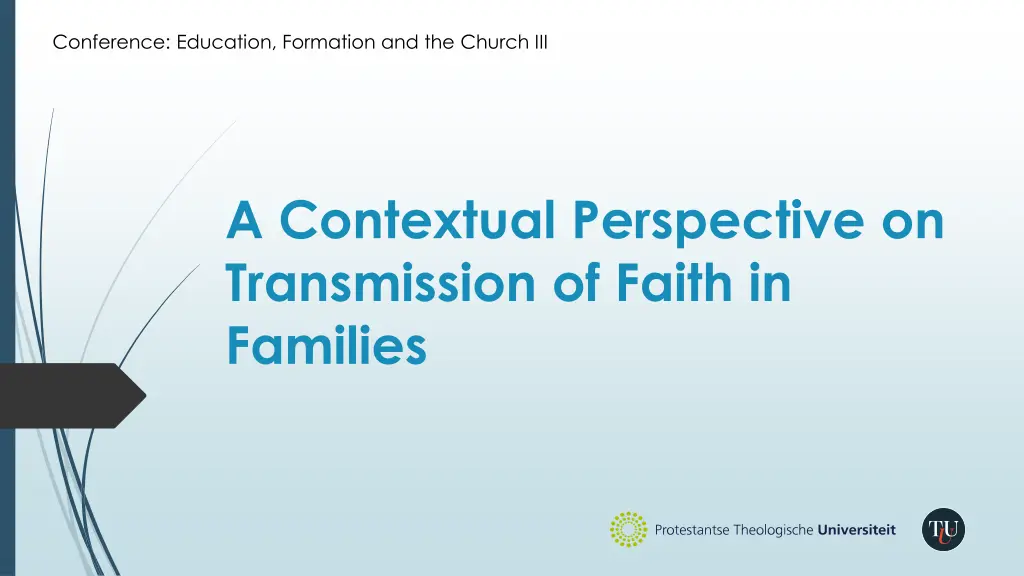
Contextual Perspectives: Faith Transmission in Families
Explore the transmission of faith in families through a contextual perspective at the Conference on Education, Formation, and the Church III. This research delves into the intergenerational and transcultural dynamics in faith transmission, emphasizing the role of family relationships and the contextual approach proposed by Ivan Nagy. Discover insights from this study on the relational process of faith transmission and its significance in the familial setting.
Download Presentation

Please find below an Image/Link to download the presentation.
The content on the website is provided AS IS for your information and personal use only. It may not be sold, licensed, or shared on other websites without obtaining consent from the author. If you encounter any issues during the download, it is possible that the publisher has removed the file from their server.
You are allowed to download the files provided on this website for personal or commercial use, subject to the condition that they are used lawfully. All files are the property of their respective owners.
The content on the website is provided AS IS for your information and personal use only. It may not be sold, licensed, or shared on other websites without obtaining consent from the author.
E N D
Presentation Transcript
Conference: Education, Formation and the Church III A Contextual Perspective on Transmission of Faith in Families
Conference: Education, Formation and the Church III PhD research Research question: What happens inter- and transgenerationally in the transmission of lived faith and to what extent does contextual approach help to describe and clarify the transmission of faith between generations Team: Promotor Henk de Roest, PhD Co-protomor Theo Pleizier, PhD Co-promotor Ronelle Sonnenberg, PhD PhD-student drs. Jan Minnema
Method Literature Position of research in the field (theology, pedagogy, sociology, psychology) Faith Transmission Family Contextual Approach Empirical research: semi structured interviews Findings Discussion Conclusion and recommendations
Program Overview of the chapters Data-collection Some findings Discussion
Family: the first and most important place of Transmission of Faith The literature shows that the first and most important transmission of faith takes place in the family. My research focuses on what happens in the relationship between parents and children in the transmission of faith. I am curious to know whether the contextual approach developed by Ivan Nagy can be helpful in describing the relationships in which faith transmission takes place.
Socialization and Individuation Based on G.H. Mead's social psychology, it is evident that socialization is about growing into a social context. On the other hand, it is about individuation. The development of individuality is intimately connected and intertwined with the social personality, the latter having primacy for Mead.
Transmission of Faith as a Relational Process Transmission (in Dutch: geloofsoverdracht) is an appropriate term to describe the process. There has been objection to this term because it would have the connotation of handing over a ready-made package. Transmission is a dynamic, reciprocal process that includes the concept of tradere to transmit.
Transmission of Tradition Chris A.M. Hermans: Tradition should be viewed as a text that has to be interpreted in presentday terms. Tradition only comes about in the process of transmission. Hervieu-L ger : There is no transmission in this sense without, at the same time, a 'crisis of transmission'." (1998, p. 214) Transmission is working on a chain of memory .
Biblical Theological Lines Included in the covenant with God, learning from generation to generation. E.g. Ex 12:7, institution of Passover. Deuteronomium 6:6,7 Psalm 78 Mattheus 28 II Timotheus 3:14-17
The Family as Focus The family, the smallest social unit, is the primary context where faith transmission occurs. The focus is on what happens in the relationships between parents (caregivers) and children in the process of transmission of faith. Contextual approach is a specific lense to examine the relationships and what is important
Contextual Approach of Ivan Nagy Nagy approaches the world from a contextual perspective, stating that people live in relationships, fundamentally linked to their parents. We are connected to each other. You need each other to be human. Nagy refers to authors as: Buber: encounter, dialogue, Ich und Du Levinas: Each I is totally responsible for the Other whom they encounter face-to- face.
Dimensions of Reality by Nagy Reality, according to Nagy, can be described based on five dimensions: 1. Facts 2. Psychology 3. Interaction 4. Relational ethics 5. Ontic dimension
Relational Ethics Relational ethics is an umbrella over the other dimensions. At its core, it emphasizes that our lives are focused on relationships.
Core Concepts of Contextual Approach in respect to transmission of faith In relation to the transmission of faith there are a couple of core concepts of the contextual approach that could apply: Connectedness and autonomy loyalty, balance of giving and receiving, caring, intergenerational responsibility, Legacy and delegate
Empirical Research From January 2022 until November 2023 : 16 semi-structured interviews. range of age of respondents: 21 70 From December 2023 until September 2024 Coding From October 2024 an ongoing : Process of Analyzing .
Some Findings Jasmine: Yes, in that tradition, so to speak, I walked along. Never consciously thought about it or. No. (Jasmijn and the tradition in which she grew up. In these words she says something about the relationship between her and her parents. She went along with her parents, in the tradition, without thinking about it. That is in terms of relational ethics: loyalty, but also a delegate. When she does not turn the delegate into a legacy then there is destructive entitlement)
Some Findings Albert: I don't think the traditional is always wrong, there are also beautiful qualities in it. But I didn't really get the part about personal faith development. Albert is loyal to his upbringing, but also notices a shortcoming in the faith transmission, namely: there was no personal development. Mostly because in the family they didnot talk about faith and church. In terms of relational ethics Albert says something about loyalty, but also about autonomy, because he himself makes different choices in the faith transmission of his own children. In that way he is in dialogue with his own parents.
Conclusion Transmission of faith in a contextual perspective reveals the deep relationality within families and communities, emphasizing both individuality and social connection. Relational ethics helps to understand what is happening between parents and children and underscores the importance of relations in the transmission of religious traditions. Helps to discover the important ingredients in relationships that help or prevent that new generations will go further in faith and church.
Discussion What do you think: Would the relational ethics help understand what is happening in relations regarding faith transmission in families?
The End Thanks a lot for your attendence!


